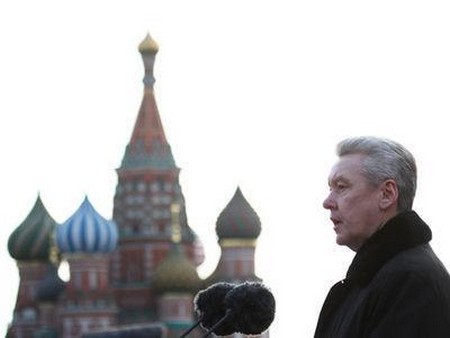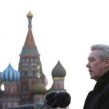
Moscow City Elections Turning into True Political Fight
Publication: Eurasia Daily Monitor Volume: 10 Issue: 137
By:

Moscow should have been in the midst of its annual mid-summer dead season, with millions of Muscovites heading to the sea in Turkey, or Crimea, or to their small dacha plots out of town. The endemic Moscow traffic jams have eased substantially until the end of August, when the population will be swarming back to town and will vote in a possible politically decisive mayoral election on September 8—the first since 2003. The incumbent Mayor Sergei Sobyanin (55), former deputy prime minister and chief of President Vladimir Putin’s presidential administration, was appointed Moscow chief in 2010. Sobyanin has been doing a reasonably good job running the city and is seeking reelection as an independent candidate, though supported by the ruling United Russia (UR) party. Sobyanin seems to want to win a fair election on September 8 and has effectively helped opposition candidates—flashy anti-corruption activist Alexei Navalny (37) and Sergei Mitrokhin from the liberal Yabloko party—to gather enough municipal deputies’ signatures from the UR to pass the so called “municipal barrier” and get on the ballot (Kommersant, July 25).
Sobyanin has requested the Federal Election Committee to gather from all over Russia several thousand usable electronic voting machines in an attempt to cover at least 30 percent of the Moscow city polling stations. In past elections, voting stations equipped with voting machines produced results less favorable to UR candidates, apparently curtailing vote rigging. Sobyanin has also called for absentee voting to be limited in an apparent attempt to avoid accusations of widespread vote rigging that marred the Duma election in 2011 and led to mass protests (Kommersant, July 24).
Sobyanin’s attempts to win the Moscow elections with grace were suddenly undermined last week, when Navalny was handed a severe five-year prison sentence for alleged theft in a politically motivated show trial in Kirov (see EDM, July 22). The prosecutor in the trial demanded a six-year sentence and for Navalny and his co-defendant, Pyotr Ofitserov, to be apprehended in court after the verdict is pronounced (ITAR-TASS, July 5). In Russia, jury trials are allowed only in serious cases like murder, so Navalny had a bench trial in Kirov with no hope of acquittal in a politically motivated case. The judge obediently handed a five-year term to Navalny and four years to Ofitserov, with both immediately apprehended. The Navalny election staff announced he would be withdrawing from the Moscow city election after apprehension (Interfax, July 18). But the prosecution suddenly reversed its stand and Navalny with Ofitserov have been freed, pending a yet-to-be-scheduled appeals hearing by a higher court in Kirov after being incarcerated only 22 hours. Navalny was allowed to take a train back to Moscow to a hero’s welcome and to continue running for city mayor (Interfax, July 20).
Up to 10,000 protesters gathered spontaneously in downtown Moscow close to the Kremlin after the Navalny prison sentence was announced, and they were eventually brutally dispersed by the riot police, which made many arrests. Protests broke out in St. Petersburg and other Russian cities (Interfax, July 19). But the sudden change of heart by the prosecutors and the court in Kirov, which gave Navalny several extra weeks of freedom, were not the result of public outrage. The freeing of Navalny and Ofitserov after a verdict has been pronounced is, according to legal experts, not permitted under existing legal procedures and, according to sources in the Sobyanin reelection campaign, happened after a direct intervention by the Kremlin. Sobyanin’s campaign staff was, apparently, hoping the trial in Kirov will not interrupt the Moscow city elections, since Navalny will be given a suspended sentence. But the apprehension of Navalny interfered with Sobyanin’s ploy to gain the political clout necessary to possibly propel him to become Putin’s chosen successor and number two in Russia by winning a fair election in Moscow. Therefore, Putin was approached to intervene to free Navalny (Vedomosti, July 22). The Kremlin officially denied Putin was directly involved in freeing Navalny and described the pro-Navalny protesters as a “rabble” (RIA Novosti, July 22).
The so called “siloviki” fraction of Russian military and security chiefs allegedly pushed for Navalny’s imprisonment to undermine Sobyanin and thus promote Defense Minister Sergei Shoigu as future prime minister and Putin’s chosen successor (https://www.gazeta.ru/politics/2013/07/19). In any case, the election campaign in Moscow has become lively. The release of Navalny after street protests gave opposition activists a sense they may yet achieve change if they push on. Leonid Volkov, Navalny’s election campaign chief-of-staff, told journalists this week: “If we win, Navalny will be acquitted; if we lose badly, he will go to prison; if we take some 20 percent of the vote—something in between” (https://www.gazeta.ru/politics/2013/07/22_a_5502937.shtml). Navalny is today a figure that may unite all discontent in Russia, like Boris Yeltsin in 1991. This author has personally witnessed in the streets of Moscow nationalists waving their trademark so-called “imperial” black-yellow-white banner (once promoted by Tsar Alexander II in the 19th century) and handing out leaflets for Navalny.
Latest polls put Navalny, with some 9 percent, second to Sobyanin with a massive 54 percent of potential votes. Most pollsters predict a walkover Sobyanin victory on September 8 (Kommersant, July 24). But a political experiment with relatively fair elections by a repressive regime that has long relied on vote rigging may bring truly unpredictable results. In March 1990, a city hall election in Moscow was the first where pro-democracy liberals won, and eventually this led to the collapse of the Communist dictatorship in Russia in 1991. But Putin is not Mikhail Gorbachev, who promoted democratization. Putin apparently believes Navalny is an agent of the United States, since in 2010 the latter took a course at Yale University. And he also views Navalny as a criminal, who must be restrained at any cost. If the master plan to first humiliate Navalny by a resounding electoral defeat and then imprison him does not work, he could be imprisoned anyway. And the more votes he receives, the more severe could be the sentence. Present Russian law excludes convicted felons from ever taking any elected position, so even a suspended sentence will prevent Navalny from being anyone but an outcast dissident in Putin’s Russia, until the regime itself is swept away by another possible Russian revolution—perhaps landing Navalny in the Kremlin instead of city hall.




